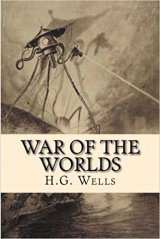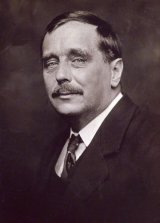The War of the Worlds Page #19
The War of the Worlds is a science fiction novel by English author H. G. Wells first serialised in 1897 by Pearson's Magazine in the UK and by Cosmopolitan magazine in the US.
Of course all the students in the crammer's biology class, to which my brother went that day, were intensely interested, but there were no signs of any unusual excitement in the streets. The afternoon papers puffed scraps of news under big headlines. They had nothing to tell beyond the movements of troops about the common, and the burning of the pine woods between Woking and Weybridge, until eight. Then the St. James's Gazette, in an extra-special edition, announced the bare fact of the interruption of telegraphic communication. This was thought to be due to the falling of burning pine trees across the line. Nothing more of the fighting was known that night, the night of my drive to Leatherhead and back. My brother felt no anxiety about us, as he knew from the description in the papers that the cylinder was a good two miles from my house. He made up his mind to run down that night to me, in order, as he says, to see the Things before they were killed. He dispatched a telegram, which never reached me, about four o'clock, and spent the evening at a music hall. In London, also, on Saturday night there was a thunderstorm, and my brother reached Waterloo in a cab. On the platform from which the midnight train usually starts he learned, after some waiting, that an accident prevented trains from reaching Woking that night. The nature of the accident he could not ascertain; indeed, the railway authorities did not clearly know at that time. There was very little excitement in the station, as the officials, failing to realise that anything further than a breakdown between Byfleet and Woking junction had occurred, were running the theatre trains which usually passed through Woking round by Virginia Water or Guildford. They were busy making the necessary arrangements to alter the route of the Southampton and Portsmouth Sunday League excursions. A nocturnal newspaper reporter, mistaking my brother for the traffic manager, to whom he bears a slight resemblance, waylaid and tried to interview him. Few people, excepting the railway officials, connected the breakdown with the Martians. I have read, in another account of these events, that on Sunday morning "all London was electrified by the news from Woking." As a matter of fact, there was nothing to justify that very extravagant phrase. Plenty of Londoners did not hear of the Martians until the panic of Monday morning. Those who did took some time to realise all that the hastily worded telegrams in the Sunday papers conveyed. The majority of people in London do not read Sunday papers. The habit of personal security, moreover, is so deeply fixed in the Londoner's mind, and startling intelligence so much a matter of course in the papers, that they could read without any personal tremors: "About seven o'clock last night the Martians came out of the cylinder, and, moving about under an armour of metallic shields, have completely wrecked Woking station with the adjacent houses, and massacred an entire battalion of the Cardigan Regiment. No details are known. Maxims have been absolutely useless against their armour; the field guns have been disabled by them. Flying hussars have been galloping into Chertsey. The Martians appear to be moving slowly towards Chertsey or Windsor. Great anxiety prevails in West Surrey, and earthworks are being thrown up to check the advance Londonward." That was how the Sunday Sun put it, and a clever and remarkably prompt "handbook" article in the Referee compared the affair to a menagerie suddenly let loose in a village. No one in London knew positively of the nature of the armoured Martians, and there was still a fixed idea that these monsters must be sluggish: "crawling," "creeping painfully"--such expressions occurred in almost all the earlier reports. None of the telegrams could have been written by an eyewitness of their advance. The Sunday papers printed separate editions as further news came to hand, some even in default of it. But there was practically nothing more to tell people until late in the afternoon, when the authorities gave the press agencies the news in their possession. It was stated that the people of Walton and Weybridge, and all the district were pouring along the roads Londonward, and that was all. My brother went to church at the Foundling Hospital in the morning, still in ignorance of what had happened on the previous night. There he heard allusions made to the invasion, and a special prayer for peace. Coming out, he bought a Referee. He became alarmed at the news in this, and went again to Waterloo station to find out if communication were restored. The omnibuses, carriages, cyclists, and innumerable people walking in their best clothes seemed scarcely affected by the strange intelligence that the news venders were disseminating. People were interested, or, if alarmed, alarmed only on account of the local residents. At the station he heard for the first time that the Windsor and Chertsey lines were now interrupted. The porters told him that several remarkable telegrams had been received in the morning from Byfleet and Chertsey stations, but that these had abruptly ceased. My brother could get very little precise detail out of them. "There's fighting going on about Weybridge" was the extent of their information. The train service was now very much disorganised. Quite a number of people who had been expecting friends from places on the South-Western network were standing about the station. One grey-headed old gentleman came and abused the South-Western Company bitterly to my brother. "It wants showing up," he said. One or two trains came in from Richmond, Putney, and Kingston, containing people who had gone out for a day's boating and found the locks closed and a feeling of panic in the air. A man in a blue and white blazer addressed my brother, full of strange tidings. "There's hosts of people driving into Kingston in traps and carts and things, with boxes of valuables and all that," he said. "They come from Molesey and Weybridge and Walton, and they say there's been guns heard at Chertsey, heavy firing, and that mounted soldiers have told them to get off at once because the Martians are coming. We heard guns firing at Hampton Court station, but we thought it was thunder. What the dickens does it all mean? The Martians can't get out of their pit, can they?" My brother could not tell him. Afterwards he found that the vague feeling of alarm had spread to the clients of the underground railway, and that the Sunday excursionists began to return from all over the South-Western "lung"--Barnes, Wimbledon, Richmond Park, Kew, and so forth--at unnaturally early hours; but not a soul had anything more than vague hearsay to tell of. Everyone connected with the terminus seemed ill-tempered. About five o'clock the gathering crowd in the station was immensely excited by the opening of the line of communication, which is almost invariably closed, between the South-Eastern and the South-Western stations, and the passage of carriage trucks bearing huge guns and carriages crammed with soldiers. These were the guns that were brought up from Woolwich and Chatham to cover Kingston. There was an exchange of pleasantries: "You'll get eaten!" "We're the beast-tamers!" and so forth. A little while after that a squad of police came into the station and began to clear the public off the platforms, and my brother went out into the street again.
Translation
Translate and read this book in other languages:
Select another language:
- - Select -
- 简体中文 (Chinese - Simplified)
- 繁體中文 (Chinese - Traditional)
- Español (Spanish)
- Esperanto (Esperanto)
- 日本語 (Japanese)
- Português (Portuguese)
- Deutsch (German)
- العربية (Arabic)
- Français (French)
- Русский (Russian)
- ಕನ್ನಡ (Kannada)
- 한국어 (Korean)
- עברית (Hebrew)
- Gaeilge (Irish)
- Українська (Ukrainian)
- اردو (Urdu)
- Magyar (Hungarian)
- मानक हिन्दी (Hindi)
- Indonesia (Indonesian)
- Italiano (Italian)
- தமிழ் (Tamil)
- Türkçe (Turkish)
- తెలుగు (Telugu)
- ภาษาไทย (Thai)
- Tiếng Việt (Vietnamese)
- Čeština (Czech)
- Polski (Polish)
- Bahasa Indonesia (Indonesian)
- Românește (Romanian)
- Nederlands (Dutch)
- Ελληνικά (Greek)
- Latinum (Latin)
- Svenska (Swedish)
- Dansk (Danish)
- Suomi (Finnish)
- فارسی (Persian)
- ייִדיש (Yiddish)
- հայերեն (Armenian)
- Norsk (Norwegian)
- English (English)
Citation
Use the citation below to add this book to your bibliography:
Style:MLAChicagoAPA
"The War of the Worlds Books." Literature.com. STANDS4 LLC, 2025. Web. 11 Jan. 2025. <https://www.literature.com/book/the_war_of_the_worlds_43>.




Discuss this The War of the Worlds book with the community:
Report Comment
We're doing our best to make sure our content is useful, accurate and safe.
If by any chance you spot an inappropriate comment while navigating through our website please use this form to let us know, and we'll take care of it shortly.
Attachment
You need to be logged in to favorite.
Log In